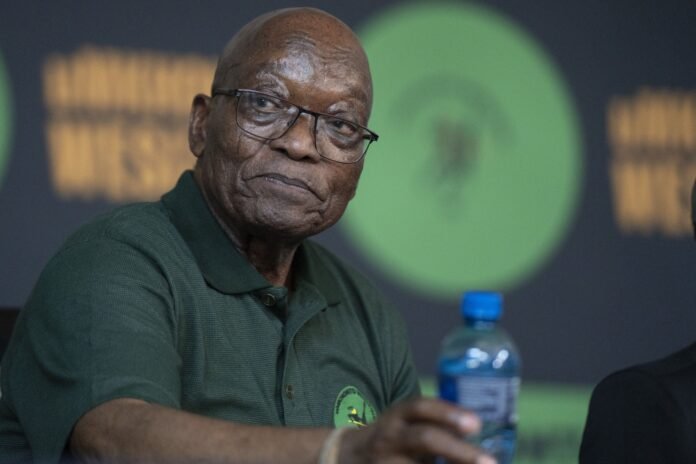Jacob Zuma’s political and legal troubles have significantly shaped South Africa’s contemporary political landscape. Zuma served as the President of South Africa from 2009 to 2018. His tenure was marked by a series of contentious political decisions and an overarching cloud of corruption allegations.
Initially, Zuma was widely seen as a champion of the working class, leveraging his background as a freedom fighter and his leadership of the African National Congress (ANC) to garner significant support.
However, his presidency gradually became overshadowed by numerous corruption scandals. The most notable of these was the controversial relationship with the Gupta family, a wealthy business clan accused of wielding undue influence over state affairs, often referred to as “state capture.”
[ Zuma Rallies Cry For Umkhonto Wesizwe Party At A Vibrant Orlando Stadium In Soweto ]
These allegations became increasingly difficult for Zuma to refute and ultimately led to his resignation in February 2018. His departure was precipitated by mounting pressure from within the ANC and widespread public outcry.
In 2021, Zuma faced another significant legal battle that further tarnished his legacy. He was sentenced to 15 months in prison for contempt of court after defying a Constitutional Court order to appear before a commission investigating state corruption during his presidency.
Zuma’s imprisonment sparked a wave of violent protests and looting across the country, highlighting the deep political and social divisions within South Africa.
Despite these setbacks, Zuma has remained a polarizing figure in South African politics. In a bid to return to the political arena, he has formed a new party, Umkhonto weSizwe (MK), named after the armed wing of the ANC during the anti-apartheid struggle.
This party is currently challenging the electoral commission’s ruling that bars Zuma from standing as a candidate due to his 2021 conviction. This legal confrontation sets the stage for a significant Constitutional Court ruling that could potentially reshape the political dynamics in South Africa.
Section 47 of the South African constitution specifies that an individual sentenced to a term of imprisonment of 12 months or more is ineligible to stand for public office until five years after the completion of their sentence.
Jacob Zuma’s candidacy has become a contentious issue, as he and his party, the African National Congress (ANC), argue against the application of Section 47 in his case.
Zuma’s legal team contends that the Independent Electoral Commission (IEC) has overstepped its mandate by enforcing a disqualification based on this conviction.
The crux of Zuma’s argument revolves around the interpretation of his contempt of court conviction. Zuma and his supporters claim that his sentence should not trigger the disqualification clause in Section 47, as the nature of the offence—contempt of court—differs from other criminal convictions typically associated with disqualification.
They assert that the IEC’s decision to bar him from running for office infringes on his political rights and exceeds the commission’s regulatory powers.
The Constitutional Court’s impending decision regarding Jacob Zuma’s eligibility to run for election carries substantial political and social ramifications for South Africa.
If the ruling results in barring Zuma from participating, the nation could potentially witness violent unrest. This concern is not unfounded, as history has shown the capacity for significant turmoil; the riots following Zuma’s imprisonment in 2021 serve as a potent reminder.
During that period, widespread unrest resulted in loss of life and extensive property damage, underscoring the deeply ingrained political passions surrounding Zuma.
Moreover, the ruling holds significant implications for the African National Congress (ANC). Zuma’s faction within the ANC, often referred to as the MK party, commands a considerable loyal following.
Should Zuma be disqualified from the election, this faction might feel disenfranchised, potentially splintering the ANC’s voter base. Such a scenario could reduce the party’s dominance and force it to consider coalition governance, a prospect that has traditionally been avoided due to the complexities and compromises it entails.
The ANC’s internal dynamics could also shift dramatically. Zuma’s supporters within the party may push back against leadership, causing internal strife and weakening the party’s cohesion.
This internal strife could spill over into the broader political landscape, affecting policy decisions and governance stability. The potential for Zuma’s MK party to either break away or significantly alter its relationship with the ANC adds another layer of uncertainty.
Catch up with the latest news from The Times Post on WhatsApp by following our channel. Click here to join.
Kindly follow @thetimespost on Instagram. On X (Twitter), follow @thetimespost2.


